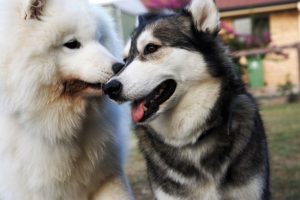
In the world of dog lovers, Samoyed and Husky are very popular even highly desired due to their beautiful appearances. Originally from Russia, these two breeds need special treatments and trainings which then explain why they may not be suitable for everyone to be kept as pets. It is not difficult to identify which one is which since each of them has distinctive signature looks. We’ll take a closer look at each of the breed and see how they are different in a few aspects – in case you feel like adopting one into your home.
Samoyed
Being one of the oldest purebred dogs in the world, Samoyed (pronunced SAMmy-ed instead of Sa-MOY-ed) has parts of the wolf genetics. It belongs to the Spitz dog family, a type of domesticated dog with thick white fur, pointed ears and muzzle and a tail that curls over its back. The breed is named after the nomadic Samoyede people of Siberia that bred the dogs to help them with herding, sled-pulling, and hunting. Samoyede treated their dogs like family members and not possessions.
One of the Samoyeds’s nicknames is Smiley, because they always seem like smiling with the curves of their mouths and dark almond-shaped eyes. They are known to be affectionate dogs that love to socialize with their people intensely. When left alone for too long, Samoyeds tend to be depressed and destructive. Also, because they are working dogs, Samoyeds need to be kept active and properly trained to prevent them from developing undesirable behavior. People who are not experienced with dogs are not advised to adopt one. As full member of family, a Samoyed is good to be around children and other dogs especially if they grow up together since small.
The life expectancy of a Samoyed dog is around 12 to 15 years although it can be prone to a genetic kidney disease called Samoyed hereditary glomerulopathy. Their most notable feature, the thick and long white fur, needs special attention to keep from getting tangled and matting. It needs to be brushed daily and also regularly washed. Because Samoyed comes from the cold region and it grows double-coat fur, it needs to stay in cool temperature. Excessive shedding could happen if they feel too hot.
Siberian Husky
Originally bred by the Chukchi people that inhabited the Bering Sea region of the Arctic Ocean within the Russian territory, Siberian Husky was meant for sled-pulling, guarding, and companionship. Huskies are known as stunning dogs with bright eyes and fur pattern that makes them look like wearing masks. Like Samoyeds, Huskies also have double coat of fur to keep them warm under harsh and very cold arctic temperature.
Siberian Huskies are working dogs that need their energy to be channeled the right way. They need a lot of activity and good discipline which makes them not suitable for novice dog owners. Huskies are intelligent, independent, and an amazing learner. They don’t need to socialize with people intensively as they are not really people pleaser. They have to be handled by humans who know how to set boundaries and are confident to maintain the alpha position around Huskies. Although good with children and other dogs under the same roof, this breed would live better in houses with yards where they can dig and run because that’s what they love to do. Huskies are good escape artists that would wander every time they have a chance to.
In warmer climate, Siberian Huskies would shed their fur more – about every three weeks. This is alright and normal, but during this time their fur needs to be brushed daily. Outside this shedding episode, it only takes once a week to brush the coats. Their teeth, on the other hand, need to be regularly checked to prevent bad breath and getting ruined early.
The Differences between Samoyed and Siberian Husky
Although both breeds have some similarities, there are several things that differ them too. Here are the main points:
1. Samoyeds have uni-color fur that ranged from white to yellowish, while Huskies have more varieties of colors and each of them bear two; a combination of white and other color from brown to grey.
2. Samoyeds need to be around people intensively and love to please their humans, while Huskies are more independent and not so eager to please people. This fact makes Samoyeds need to be a full family member because they get depressed and destructive if left alone for too long.
3. Samoyed makes an excellent guard dogs due to their nature as herder, but Siberian Husky is more of a companion that would not bark even at strangers – though they howl sometimes.
4. Samoyeds have longer, thicker fur than Huskies that need more care and treatment to keep it from tangling and matting.
5. Samoyeds look friendly with the smiles on their faces that give them the “Smiley” nickname, while Huskies look more stern and standoffish.
6. Although both breeds are working dogs, Siberian Huskies need heavier activities than Samoyeds. They need to be taken outside on a leash and run alongside a bicycle to get their energy properly channeled. Samoyeds will be satisfied with lighter exercises around the house though they need to walk, too.
Those are the 6 main differences between Samoyed and Siberian Husky. These two Russian dogs are always get to be compared – usually together with an Alaskan Malamute, too – when people want to adopt one. Just like people, dogs have their own personalities that should be put into considerations before taking them as new family members. They need suitable home and people to be healthy and happy and build a good mutual relationship. One more thing, before you plan to buy a dog, check your local shelters first. Some dogs need home better than the others.
